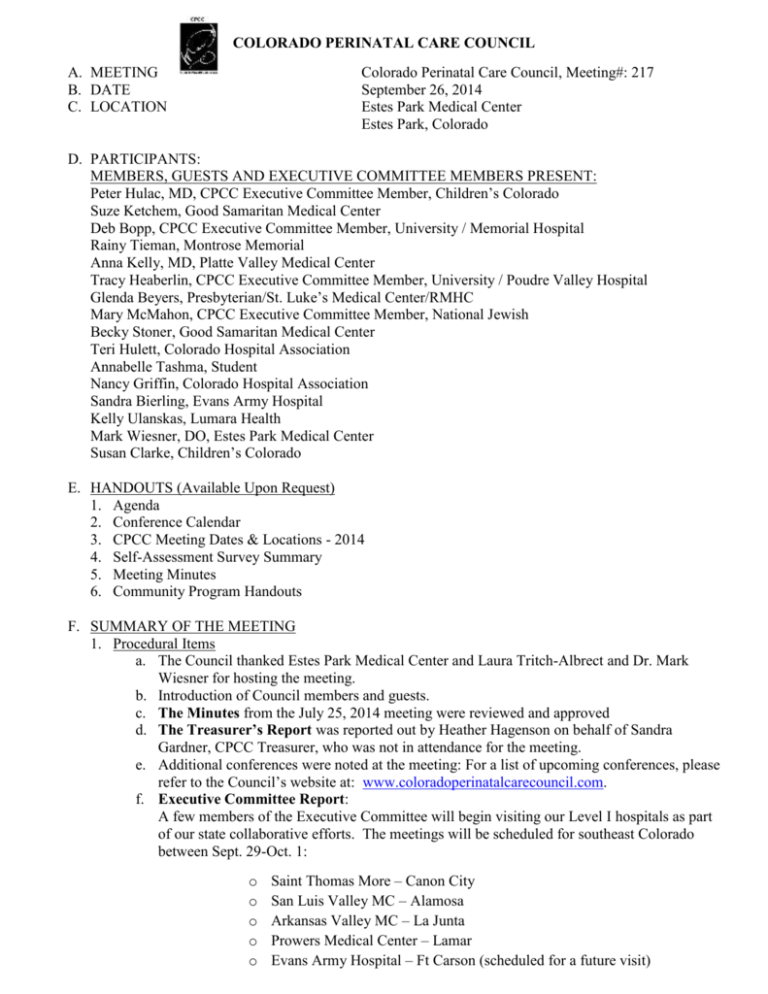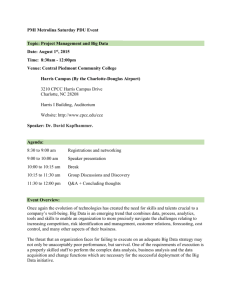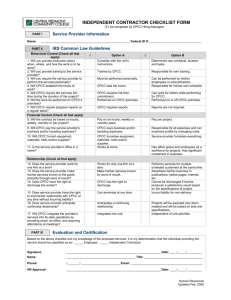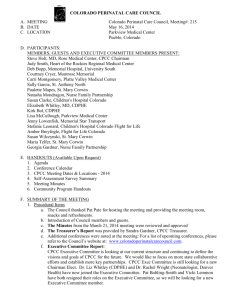COLORADO PERINATAL CARE COUNCIL
advertisement

COLORADO PERINATAL CARE COUNCIL A. MEETING B. DATE C. LOCATION Colorado Perinatal Care Council, Meeting#: 217 September 26, 2014 Estes Park Medical Center Estes Park, Colorado D. PARTICIPANTS: MEMBERS, GUESTS AND EXECUTIVE COMMITTEE MEMBERS PRESENT: Peter Hulac, MD, CPCC Executive Committee Member, Children’s Colorado Suze Ketchem, Good Samaritan Medical Center Deb Bopp, CPCC Executive Committee Member, University / Memorial Hospital Rainy Tieman, Montrose Memorial Anna Kelly, MD, Platte Valley Medical Center Tracy Heaberlin, CPCC Executive Committee Member, University / Poudre Valley Hospital Glenda Beyers, Presbyterian/St. Luke’s Medical Center/RMHC Mary McMahon, CPCC Executive Committee Member, National Jewish Becky Stoner, Good Samaritan Medical Center Teri Hulett, Colorado Hospital Association Annabelle Tashma, Student Nancy Griffin, Colorado Hospital Association Sandra Bierling, Evans Army Hospital Kelly Ulanskas, Lumara Health Mark Wiesner, DO, Estes Park Medical Center Susan Clarke, Children’s Colorado E. HANDOUTS (Available Upon Request) 1. Agenda 2. Conference Calendar 3. CPCC Meeting Dates & Locations - 2014 4. Self-Assessment Survey Summary 5. Meeting Minutes 6. Community Program Handouts F. SUMMARY OF THE MEETING 1. Procedural Items a. The Council thanked Estes Park Medical Center and Laura Tritch-Albrect and Dr. Mark Wiesner for hosting the meeting. b. Introduction of Council members and guests. c. The Minutes from the July 25, 2014 meeting were reviewed and approved d. The Treasurer’s Report was reported out by Heather Hagenson on behalf of Sandra Gardner, CPCC Treasurer, who was not in attendance for the meeting. e. Additional conferences were noted at the meeting: For a list of upcoming conferences, please refer to the Council’s website at: www.coloradoperinatalcarecouncil.com. f. Executive Committee Report: A few members of the Executive Committee will begin visiting our Level I hospitals as part of our state collaborative efforts. The meetings will be scheduled for southeast Colorado between Sept. 29-Oct. 1: o o o o o Saint Thomas More – Canon City San Luis Valley MC – Alamosa Arkansas Valley MC – La Junta Prowers Medical Center – Lamar Evans Army Hospital – Ft Carson (scheduled for a future visit) CPCC received a grant through CDPHE to visit their sites. The purpose of the CPCC visit is to introduce the work of the council, become acquainted with their regional providers, and to share data specific to their regions with comparative data from regions throughout the state. Representatives from the council, which include Maternal-Fetal Medicine, Obstetrics, NurseMidwifery, Neonatology and a Maternal Health Specialist from the CDPHE, will be visiting their facility. CDPHE Maternal Mortality Review Committee Members who are interested in joining CPCC on these site visits are: Kent Heyborne, MD Krista Beckwith It will be a 2-3 hour site visit that will cover MMR info, OB and neonatal topics, discussions around what their needs are, and our outreach and collaborative efforts. CPCC has also requested an additional grant from March of Dimes to provide formal outreach initiatives. The Executive Committee is also working on topics for the upcoming November agenda, which will include EMR documentation – what are the legal issues, defining chronic lung disease, social media in healthcare and Self-Assessments. The Executive Committee is also working on the 2015 meeting dates and locations. CPCC will also continue to work on the issues surrounding marijuana in pregnancy and breastfeeding, and will determine the next steps. CPCC is still recruiting for a Chairman elect for 2015 and currently looking at the CPCC organizational structure as we begin to formalize our state collaborative work. The Executive Committee is also exploring opportunities with CHA and March of Dimes regarding quality outcomes in areas of common interest and possible grant opportunities. g. Conference Calendar: Please send Heather any 2014 conferences from your organization or in your community The following summaries are from the presentations from the September 26, 2014 meeting: I. Estes Park Medical Center Perinatal Services Update Presented by: Mark Wiesner, DO, Pediatrician, Estes Park Medical Center Dr. Wiesner provided an overview of the women’s and children’s services offered at Estes Park. II. National and State Perinatal Collaboratives and Toolkits Presented by: Steve Holt, MD, FACOG, CPCC Chairman, Chair, Dept of Obstetrics and Gynecology, Rose Medical Dr. Holt began his presentation by defining what perinatal collaboratives are, and reiterated that provider involvement and relationships with professional societies and other agencies is critical. He shared that 28 states currently have Perinatal Collaboratives and each state has a different infrastructure and level of sophistication. California, Ohio, New York, Tennessee and Florida are examples of well-developed collaboratives with extensive information available on their websites. Dr. Holt shared that State Collaboratives can have significant impact on perinatal outcomes in their states. Dr. Holt then reviewed in detail the collaboratives, quality projects and outcomes for California Quality Care Collaborative (CMQCC) and the Ohio Perinatal Quality Collaborative (OPQC). He then discussed the Colorado Perinatal Care Council (CPCC) history and the current collaborative efforts. He discussed the current CPCC structure, including the structure and design of the meetings. Dr. Holt shared the past and present QI projects and outcomes of CPCC. He discussed the upcoming visits to the designated Level I hospitals. Dr. Holt closed his presentation by providing the future collaborative efforts that CPCC will continue to work on, including the Colorado Department of Public Health & Environment and Colorado Hospital Association partnerships. A copy of Dr. Holt’s presentation can be found on the CPCC website. Neonatal Quality Collaboratives Presented by: Tracy Heaberlin, NNP-BC, MSN, MBA, Children’s Hospital Colorado CPCC Executive Committee Member Tracy began her presentation by providing an overview of the Colorado Perinatal Quality Collaborative and the goals and outcomes of past and current work. She provided a brief overview of the Vermont Oxford Network (VON), and shared the 10 Colorado hospitals who currently participate in VON. She reviewed the current QI projects that CPCC is working on and shared some of the specific birth certificate data as it relates to the QI projects. Tracy also compared Colorado specific data to the national VON data. She shared that quality collaboratives are typically networks of perinatal and neonatal care providers and public health professionals working to improve pregnancy outcomes for women and newborns by advancing evidence-based clinical practices and processes. The CDC funds statewide perinatal collaboratives in California, New York, and Ohio through RFP’s and Grants. Tracy then outlined the hot topics in neonatal quality initiatives, including: • Neonatal Abstinence Syndrome (NAS) • Critical Congenital Heart Disease Screening • Breast Milk Use in preterm • Probiotics • Cooling Data (head/body) and Outcomes She discussed the issue of Substance Exposed Newborns and NAS and stated that it’s time to participate in this quality initiative, as Colorado is number 2 in prescription drug abuse. Tracy then reviewed the future QI projects that states will begin working on, including: Probiotics to decrease NEC, Neonatal Antibiotic Stewardship, Reduce the Frequency of Extra Uterine Growth Restriction, Standardization of Delayed Cord Clamping Practice. She concluded her presentation by summarizing what it takes to build a successful, statewide, perinatal improvement collaborative in Colorado. A copy of Tracy Heaberlin’s presentation can be found on the CPCC website. III. Reducing Pharmacologic Treatment Duration and Improving Parental Education for Patients with Neonatal Abstinence Syndrome Presented by: Rachel Wright, MD, Neonatologist, Interim Director of Newborn Services, Denver Health Medical Center Dr. Wright began her presentation by providing an overview of Neonatal Abstinence Syndrome. The most common behaviors and signs are neurologic, GI and autonomic symptoms. Dr. Wright then went on to discuss the NAS Task Force that was created at Denver Health. The goals of the task force were to reduce the duration of drug exposure to treated infants by at least 50% and to improve parental education and understanding of the management of NAS. Dr. Wright then provided an overview of the setting, methods, and tools that were used. She discussed the forms and guidelines that were created, and reviewed the measures and data/results that were collected. Data was collected for patients who received inpatient or outpatient methadone treatment at DH between July 1, 2013 and August 30, 2014, and compared to historic Denver Health data. Initial treatment and weaning using standardized protocols resulted in a reduction in median treatment duration from 159 days to 68 days. Treatment duration trended downward, but length of hospital stay has trended upward. Dr. Wright then summarized the results: • To date, the Denver Health NAS QI initiative has achieved the aim of reducing total length of drug exposure for treated infants by at least 50%. • Of the patients successfully weaned as outpatients, all families expressed good understanding of instructions and were able to wean almost 80% of the time when instructed to do so. • • Unfortunately, one patient failed outpatient methadone weaning due to several hospital readmissions and identification of errors in maternal medication administration at home. Therefore, a decision was made to temporarily suspend home methadone weaning. The recent switch to inpatient methadone weaning shows potential for further reducing treatment duration, but may result in longer lengths of stay. A copy of Dr. Wright’s presentation can be found on the CPCC website. IV. Serving Families Impacted by Substance Presented by: Kathryn Wells, MD, FAAP,Medical Director, Denver Health Clinic Family Crisis Center Dr. Wells provided an overview of the pregnant woman who uses substances and th associated behaviors Dr. Wells provided an overview of the pregnant woman who uses substances and the challenges of specifically defining the problem. She shared statistics of the prevalence of substance abuse during pregnancy and the prevalence in Colorado. Dr. Wells reviewed that the effects of substance abuse vary widely and the effects are variable on the mother, baby or both. She further outlined that substance use during pregnancy resulted in newborns who are at an increased risk for certain complications. She also shared that the effects on the baby differ with different exposure patterns, such as the relationship to gestational age and how much, how often and the route of the drug that is used. She then reviewed in great detail the five points of intervention, including pre-pregnancy, prenatal, birth, post-natal and throughout childhood. Dr. Wells shared other organizations who were interested in this topic and who could provide additional resources and support: • ACOG: www.womenandalcohol.org (2/12) • AAP: PCP’s screen & diagnose FASDs FASD Toolkit 3/2013: www.aap.org • Am Soc Addict’n Med: AOD risk (7/11) • SBIRT Model • State Meth Task Force SEN Committee www.coloradodec.org/substanceexposednewborns.html Dr. Wells reviewed the NAS work that has been done so far, including 8 regional meetings that brought together local professionals in Medicine & Nursing, Public Health, Behavioral Health, Prevention, Family Support, Law Enforcement & Judicial, Community Education. These groups developed local action plans, identified statewide themes and disseminated materials Dr. Wells concluded her presentation by sharing that moving forward more education and policies need to be implemented. A copy of Dr. Well’s presentation can be found on the CPCC website. The meeting was adjourned. The next CPCC meeting is scheduled for November 21, 2014 from 9am – 12pm. Respectfully Submitted, Heather Hagenson, CPCC Coordinator









